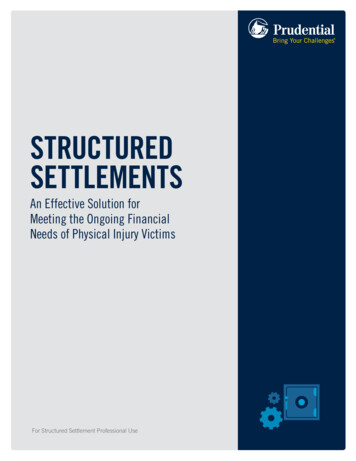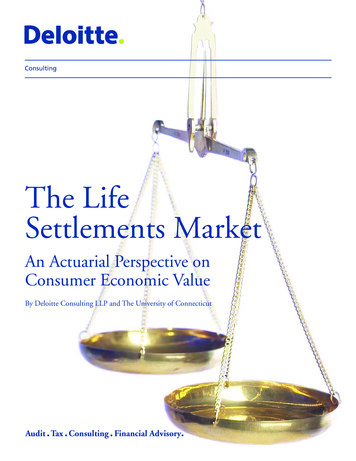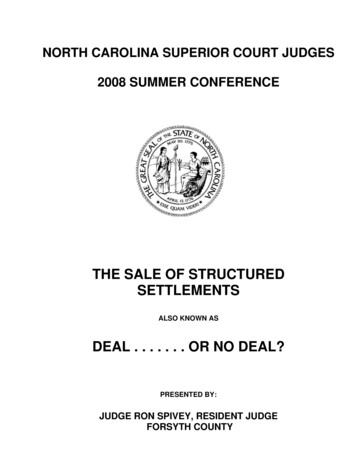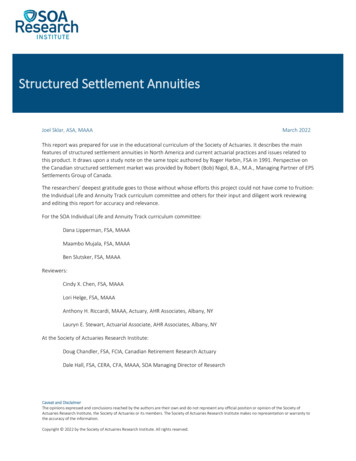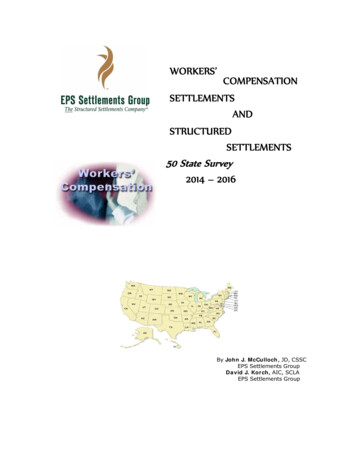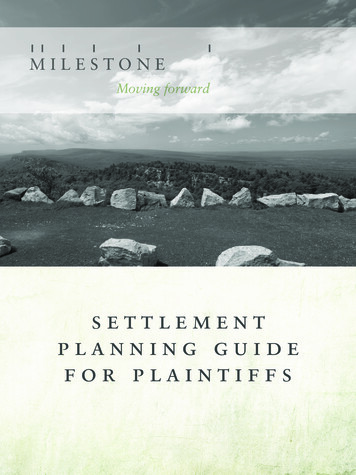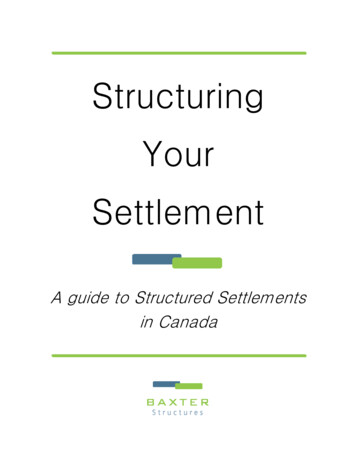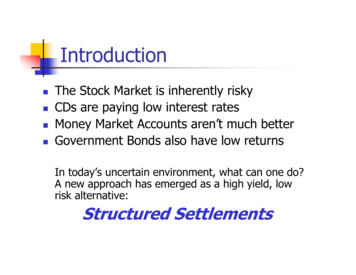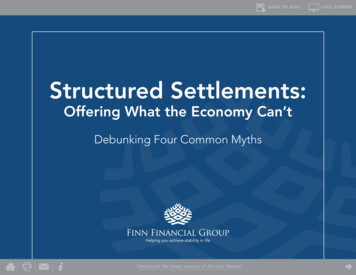
Transcription
SAVE TO DISCStructured Settlements:Offering What the Economy Can’tDebunking Four Common MythsDownload the latest version of Acrobat ReaderFULL SCRE EN
SAVE TO DISCFULL SCRE ENStructured Settlements:Dan FinnOffering What the Economy Can’tCPCU, CSSCDebunking Four Common MythsStructuredSettlements:Offering What the Economy Can’tIn a climate of economic uncertainty, people naturally worry about their financial future more sothan usual. For those settling personal injury claims, the fear is compounded because the stakescan be so much higher.To make matters worse, fearmongers with hidden agendas prey upon unnerved plaintiffs byspreading false and misleading information about settlement options under the guise of offeringhelpful advice.But is unfounded fear a good enough reason to pass up a structured settlement opportunity?Probably not. So before rejecting any settlement option, it can be extremely helpful to look backward to see how people fared in other times of economic hardship. History can be a pretty goodteacher if you take the time to understand its lessons.So, for the benefit and peace of mind of clients and the attorneys who represent them, let’s addressa few of the more common misperceptions circulating about structured settlements today and putthem in perspective.Download the latest version of Acrobat Reader2/11
SAVE TO DISCDan FinnCPCU, CSSC1FULL SCRE ENMyth: Structured Settlement Viability DependsPrimarily Upon Market ConditionsThe underlying premise that structured settlements are “an investment” is false at its core.Those who view structured settlements exclusively in terms of how other investments may performmay wish to look deeper. Consider the following:StructuredSettlements:Offering What the Economy Can’tPrice Isn’t Everything — Few rational people would buy a house built on a toxic dump sitesimply because it costs less than one in a safe neighborhood with good schools.Needs Should Trump Wants — People generally do not buy a car based solely on its sticker price. An individual wishing to start a towing business, for instance, is unlikely to choosea Smart Car simply because it’s less expensive than a Dodge Ram 3500.Doesn’t it make more sense to first analyzeone’s needs and consider ALL options designed to meet those needs?In practical terms, many factors should beconsidered before accepting or rejecting astructured settlement.Structured settlements have a proven trackrecord of offering safe, secure, tax-advantaged income for those who need it whenthey need it. The Dow Jones IndustrialAverage cannot make such a claim.Better: Ask yourself/your client thesequestions: What will you need themoney for? When will you need it?Download the latest version of Acrobat Reader3/11
SAVE TO DISCFULL SCRE ENThe family of a ventilator-dependent quadriplegic is going to care far less about the overall economythan they are about the ability of settlement proceeds to provide long-term security for their loved one.Dan FinnA widower whose wage-earning spouse was killed by a drunk driver will likely be more concernedabout meeting the day-to-day financial obligations of his family than he will hoping to eke out a fewextra dollars in stock returns.CPCU, CSSCREALITY CHECK: Structured settlements transcend market conditionsbecause, as a needs-based option, they eliminate financial guesswork.StructuredSettlements:Offering What the Economy Can’tDownload the latest version of Acrobat Reader4/11
SAVE TO DISC The Financial Panic of 1873, andThe Great Depression16.0%13.0%31 years10.0%? years35 9201.0%1910Offering What the Economy Can’tSimilarly, people who base their assumptions about interest rates on their own recent memory aregoing to limit their ability to properly evaluate any settlement option. Yes, long-term rates are lowerthan most of us in the workplace can ever remember. But what happens if we take a longer view?What if we compare today’s rates to those surrounding some of the other major financial meltdowns of prior centuries? Specifically,1900StructuredSettlements:When Matt Damon’s character in Good Will Hunting solved the “unsolvable” algebraic graphtheory problem written on the chalkboard of the MIT classroom where he worked as a janitor, hedidn’t know it was unsolvable. True, the character was a mathematical genius but it’s also true hewas unhampered by the self-imposed limitations that came from knowledge that the solution to theproblem was “impossible.”1890CPCU, CSSCMyth: Interest Rates Are at Historic Lows SoIt’s a Mistake to Structure1880Dan Finn2FULL SCRE ENSource: Irrational Exuberance, Princeton, 2005Download the latest version of Acrobat Reader5/11
SAVE TO DISCFULL SCRE ENAccording to data extrapolated from Irrational Exuberance (Princeton, 2005) interest rates typicallydropped before, during and following major cataclysmic events such as those mentioned. But howlong did rates remain “depressed?”Dan FinnCPCU, CSSCStructuredSettlements:Offering What the Economy Can’tThree times in our nation’s history have long-term interest rates fallen below 4% and remained therefor longer than a year. 1880, 1924 and 2008. While it’s too soon to know with any degree of certaintyhow long rates will remain “low” this time around, most people are shocked to learn that the lasttwo times this happened, rates stayed below 4% for more than 30 years!Certainly rates might rise but anyone who denies the possibility that we might need to adjust toliving with the current interest rate environment for quite awhile may be relying too heavily onshort-term experience.REALITY CHECK: Structure settlements provide long-term guaranteedincome that offers a major tax advantage and will remain popularregardless of interest rate cycles.Download the latest version of Acrobat Reader6/11
SAVE TO DISCDan FinnCPCU, CSSCStructuredSettlements:Offering What the Economy Can’t3FULL SCRE ENMyth: Inflation Will Lower the Value of FutureStructured Settlement PaymentsAt the risk of downplaying the importance of thisconcern: Isn’t this true of all financial products? Ofcourse inflation will impact structured settlementpayments. Just as it will affect retirement savings andeverything else with a dollar sign attached to it.But since most structured settlement recipientsuse their benefits to provide secure steady cashflow, they can’t afford the luxury of setting asidefunds in some speculative investment hoping tooutsmart the inflation boogeyman. (Reminder:stocks are investments which can lose value aseasily as they can gain value)So what about inflation? What does history teachus about this ominous presence?A review of annual historical data compiled by theBureau of Labor Statistics reveals that, since 1914,inflation has been above 4% in only thirty-one ofthose years. And almost half of that took placeduring the stagflation years of the 70s — early 80s.That means 67% of the time, inflation has beenbelow 4%. Knock out the oil embargo years andit’s been manageable more than 75% of the time.SURPRISE: In the decade following theGreat Depression, inflation only roseabove 3% twice and was negative forsix out of those ten years!Download the latest version of Acrobat Reader7/11
SAVE TO DISCDan FinnCPCU, CSSCStructuredSettlements:FULL SCRE ENFor plaintiff attorneys who structure their fees, a recent article in Kiplinger’s Retirement Report offersan encouraging perspective. In its article “A Ladder of Annuities Can Hedge Your Bets” (November,2009, p. 6) the authors suggest “laddering” annuity purchases (i.e. Buying annuities over a periodof time as opposed buying all at once) to achieve an optimum balance of retirement security andhedge against inflation. They point to a 25-year MassMutual study that compared and contrastedseveral retirement-income strategies only to discover the portfolio with laddered annuities returned67% more money than the traditional stock/bond portfolio and provided the highest return of allportfolios studied.REALITY CHECK: Structured settlements can actually serve as a hedgeagainst inflation by designing plans that anticipate increased costs.Offering What the Economy Can’tDownload the latest version of Acrobat Reader8/11
SAVE TO DISCDan FinnCPCU, CSSCStructuredSettlements:Offering What the Economy Can’t4FULL SCRE ENMyth: Over Time, The Stock Market Will AlwaysOutperform Structured SettlementsThe secret to good comedy is timing. But there’s nothing funny about the anxiety most all of us feltwhen bad timing caused the balances of our 401(k) plans to nosedive.Like many people, I followed the conventional wisdom of investing in balanced mutual funds for my401(k) contributions for many years. Unfortunately, annuity purchases weren’t one of the options mycompany’s 401(k) plan administrator offered. Notwithstanding, I enjoyed watching the value of myretirement fund grow seemingly by the hour and kept stashing away as much as I could year afteryear. I was dollar-cost averaging and was secure (or thought I was) in the knowledge that my nestegg would continue to grow exponentially with only periodic blips along the way.But then the BIG bottom fell out!My account dropped to less thanhalf its value. And it did so in a hurry!More than two years and 200 or sobottles of Pepto-Bismol later, the balance has gained back a good portionof what it gave up but the anxietybrought on by this financial chaoswas, and still is, difficult to endure.For years I compared mutual fund“10-Year Averages” in excess of 10%and made seemingly wise choicesaccordingly. A review of my 401(k)balance recently revealed my averageperformance for the past ten yearsto be less than 2% thanks mostly to2008/2009. (2010 and 2011 have, untilAugust, fared far better) I supposeDownload the latest version of Acrobat Reader9/11
SAVE TO DISCFULL SCRE ENthis means my 20 year average is somewhere between the two. Still not bad. Little comfort, though,when I read my statement these days. But at this point I’m just thankful Bernie Madoff wasn’t myadvisor. Meanwhile, pass the Pepto-Bismol please.Dan FinnCPCU, CSSCStructuredSettlements:Offering What the Economy Can’tGRIM REMINDER: A portfolio loss of 50% requires a gain of 100% just tobreak even!Finally, the most overlooked fallacy of comparing stock fund returns to those of annuities is this:Stock return averages typically assume a buy-and-hold strategy whereas annuities provide cashflow. They really are apples and oranges. Stocks can offer terrific wealth accumulation potential. Butthey can also lead to untold misery. Fixed annuity returns are commensurate with their risk. Withlower risk one naturally expects lower returns. But as any fan of Aesop knows, the tortoise crossesthe finish line first in the end.REALITY CHECK: With a decided tax advantage, structured settlementscompare favorably to long-term stock market averages. Minus the anxiety.Download the latest version of Acrobat Reader10/11
SAVE TO DISCFULL SCRE ENSummaryDan FinnCPCU, CSSCStructured settlements remain a solidly viable settlement alternative in good times and, somewould argue, especially in bad times. Those seeking safe, secure, tax-advantaged cash flows shouldconsider this proven alternative and reject any fear-based propaganda.Plaintiff attorneys and their clients have many options available to them when choosing how toarrange their post-settlement financial affairs. Careful evaluation of a person’s risk tolerance andgoals will usually lead to the right decision. For many, a structured settlement will be a sensible partof their solution.StructuredSettlements:Offering What the Economy Can’tDownload the latest version of Acrobat Reader11/11
SAVE TO DISCDan FinnCPCU, CSSCStructuredSettlements:FULL SCRE ENAbout the AuthorDan Finn is President of Finn Financial Group, LLC — A Newport Beach (CA) based specialty planning firm offering Structured Settlements and related products and services for clients nationwide.A former teacher, he also offers customized training seminars to clients seeking expertise in thisarea. ubeOffering What the Economy Can’tContact InfoFinn Financial Group, LLC260 Newport Center Drive, Suite 100Newport Beach, CA 92660Phone: 949.999.3322Cell: 949.274.5485Fax: 949.999.3375Copyright 2011 by Dan Finn. All rights reserved. No portion of this publication may be reproduced, stored in a retrievalsystem or transmitted in any form by any means—except for brief quotations in published reviews—without the prior writtenpermission of the author.Download the latest version of Acrobat Reader
Structured Settlements: Offering hat the Economy Can't 2/11 Structured Settlements: Offering What the Economy Can't Debunking Four Common Myths In a climate of economic uncertainty, people naturally worry about their financial future more so than usual. For those settling personal injury claims, the fear is compounded because the stakes
